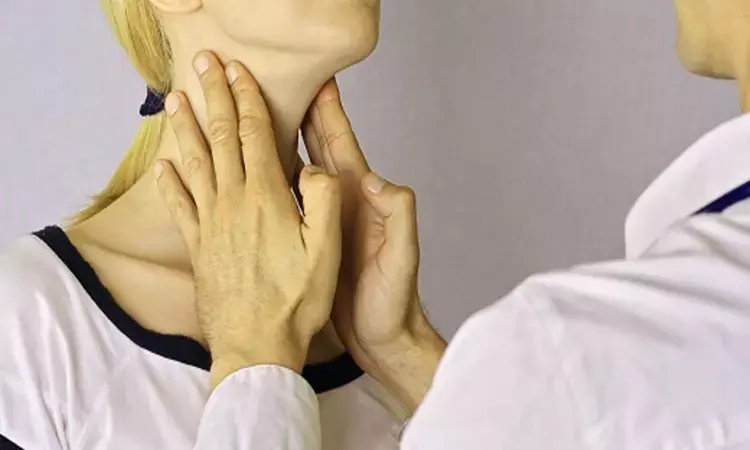- Home
- Medical news & Guidelines
- Anesthesiology
- Cardiology and CTVS
- Critical Care
- Dentistry
- Dermatology
- Diabetes and Endocrinology
- ENT
- Gastroenterology
- Medicine
- Nephrology
- Neurology
- Obstretics-Gynaecology
- Oncology
- Ophthalmology
- Orthopaedics
- Pediatrics-Neonatology
- Psychiatry
- Pulmonology
- Radiology
- Surgery
- Urology
- Laboratory Medicine
- Diet
- Nursing
- Paramedical
- Physiotherapy
- Health news
- Fact Check
- Bone Health Fact Check
- Brain Health Fact Check
- Cancer Related Fact Check
- Child Care Fact Check
- Dental and oral health fact check
- Diabetes and metabolic health fact check
- Diet and Nutrition Fact Check
- Eye and ENT Care Fact Check
- Fitness fact check
- Gut health fact check
- Heart health fact check
- Kidney health fact check
- Medical education fact check
- Men's health fact check
- Respiratory fact check
- Skin and hair care fact check
- Vaccine and Immunization fact check
- Women's health fact check
- AYUSH
- State News
- Andaman and Nicobar Islands
- Andhra Pradesh
- Arunachal Pradesh
- Assam
- Bihar
- Chandigarh
- Chattisgarh
- Dadra and Nagar Haveli
- Daman and Diu
- Delhi
- Goa
- Gujarat
- Haryana
- Himachal Pradesh
- Jammu & Kashmir
- Jharkhand
- Karnataka
- Kerala
- Ladakh
- Lakshadweep
- Madhya Pradesh
- Maharashtra
- Manipur
- Meghalaya
- Mizoram
- Nagaland
- Odisha
- Puducherry
- Punjab
- Rajasthan
- Sikkim
- Tamil Nadu
- Telangana
- Tripura
- Uttar Pradesh
- Uttrakhand
- West Bengal
- Medical Education
- Industry
Synthetic and desiccated thyroid products equally effective to treat hypothyroidism: Study

Synthetic and desiccated thyroid products equally effective in treating hypothyroidism
A study by researchers at Kaiser Permanente in Denver, Colorado evaluated the stability of thyroid stimulating hormone (TSH) in patients using synthetic medication versus those using desiccated thyroid products to treat hypothyroidism.
The results showed no difference in TSH stability over a three-year period between patients taking desiccated thyroid products and those on synthetic levothyroxine.This is an unanticipated finding given concerns about variability among batches of desiccated thyroid, which is prescribed much less frequently than synthetic levothyroxine.
In an accompanying editorial, Jill Schneiderhan and Suzanna Zick argue in favor of a patient-centered approach as opposed to relying primarily on laboratory results when determining the best way to manage hyperthyroidism. Emerging evidence shows that for many patients taking levothyroxine, symptoms persist despite lab results indicating normal TSH values. Further, these patients may feel invalidated and not in control of their treatment decisions. Schneiderhan and Zick conclude, "[k]eeping desiccated thyroid medications as an option in our tool kit will allow for improved shared decision making, while allowing for patient preference, and offer an option for those patients who remain symptomatic on levothyroxine monotherapy."
Regarding study limitations, this was a retrospective chart review in which we were unable to account for confounding variables such as adherence, differences in prescriber practice between agents, or concurrent medications that could have affected TSH. We were also unable to assess subjective outcomes of hypothyroidism management. There was a statistically significant difference between the baseline TSH value of patients prescribed desiccated thyroid (2.4 uIU/mL) compared with those prescribed synthetic levothyroxine (3.4 (uIU/mL), although both groups were within the KPCO TSH reference range.
This study adds to the limited body of evidence regarding the stability of levothyroxine and desiccated thyroid. A previous study noted that TSH levels remained within reference range for 12 weeks in patients treated with either 12 weeks in patients treated with either levothyroxine or desiccated thyroid.5 This study showed that after 3 years, TSH values in both groups remained within reference ranges approximately 80% of the time.
Hina Zahid Joined Medical Dialogue in 2017 with a passion to work as a Reporter. She coordinates with various national and international journals and association and covers all the stories related to Medical guidelines, Medical Journals, rare medical surgeries as well as all the updates in the medical field. Email: editorial@medicaldialogues.in. Contact no. 011-43720751
Dr Kamal Kant Kohli-MBBS, DTCD- a chest specialist with more than 30 years of practice and a flair for writing clinical articles, Dr Kamal Kant Kohli joined Medical Dialogues as a Chief Editor of Medical News. Besides writing articles, as an editor, he proofreads and verifies all the medical content published on Medical Dialogues including those coming from journals, studies,medical conferences,guidelines etc. Email: drkohli@medicaldialogues.in. Contact no. 011-43720751


